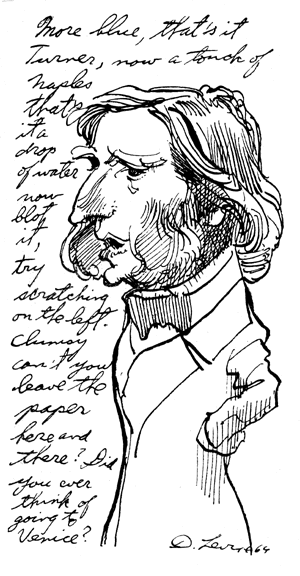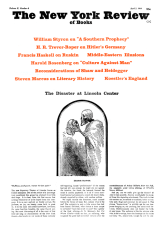A man of the most searing sensual passions and dreams of masterful authority driven by them beyond the bounds of sanity; a visionary, surely, and the greatest prose writer of his age, forced by natural disgust at its callous cruelty and ugliness to create his own “paradis artificiels“; a Lear of the nineteenth century, who could write of himself and his deluded feudal kingdom “And what am I, myself then, infirm and old, who take, or claim, leadership even of these lords?…. Bred in luxury, which I perceive to have been unjust to others, and destructive to myself; vacillating, foolish, and miserably failing in all my own conduct in life—and blown about hopelessly by storms of passion—I, a man clothed in soft raiment,—I, a reed shaken with the wind…” This surely is the Ruskin who can still speak to us today. As a writer on art he was at times profound and certainly influential—but his dogmatic confusion now bewilders more than it enlightens; as an economist his hatred of the repellent stupidities of contemporary doctrines stimulated him more to nobly foolish ones of his own than to practical remedies—though much that he dreamed of is now part of our lives, and the effect on Gandhi and the young Labour Party was significant; his influence on Proust is more a matter for literary historians than for the general reader. What then remains? Praeterita, certainly, that perfect autobiography—but also a thousand fragments which bring to life one of the most richly gifted and tragic of men, whose heart had been “broken ages ago, when I was a boy—then mended, cracked, beaten in, kicked about old corridors, and finally, I think, flattened fairly out.”
For all the density of his sweeping paragraphs he responds most rewardingly to anthologies. Mr. Rosenberg, who wrote a really superb study two or three years ago, has now followed it up with a very perceptive choice from his works. This, combined with a few other excellent contributions of recent years and the most sensitive exhibition devoted to his life which has just closed in London, will surely resurrect him finally from the neglect into which he had fallen.
Every age is—and (despite the warnings of scholars) is surely right to be—unfairly selective in its estimate and recreation of past genius. We, who live at a time which has chosen to admire the “black” Dickens, the revelations of mescalin addicts, the confessions of those “who allow themselves to be wholly known,” should find no difficulty in creating a Ruskin of our own. Our information about his unconsummated marriage is relevant here: Impotent he may have been, but his formidable sexual energy was only transposed: “There is a strong instinct in me, which I cannot analyse—to draw and transcribe the things I love…a sort of instinct like that for eating or drinking. I should like to draw all St. Mark’s…stone by stone—to eat it all up into my own mind—touch by touch.” And in his impotence he resembled, surely not by coincidence, that other great nineteenth-century writer on painting, Baudelaire. Paradoxically, there is a certain parallel between these two guilt-ridden artists, who believed so assiduously in Satan. Ruskin too could have felt at one stage of his life that
Ce monde rayonnant de métal et et de pierre
Me ravit en extase, et j’aime à la fureur
Les choses où le son se mêle à la lumière
though he would hardly have welcomed seeing the jewelry which inspired these lines on the naked body of his beloved.
Like Baudelaire, though from a very different angle, Ruskin was obsessed by his parents: his father “dark-eyed, brilliantly active, sensitive, with his flashingly transient amours” and his mother, an “absolutely respected and admired—mildly liked governess and confidante.” Echoing these temperamental differences is the reckless enthusiasm of his descriptions which always has to be kept in check by that preaching, which so helped his reputation in the nineteenth century and has so damaged it in ours. The two attitudes are inextricably combined, and to separate them would amount to more than a distortion—it would be an impossibility. And yet though, as Mr. Rosenberg and others have pointed out, the moralizing in his aesthetics led directly to his humanitarian social doctrines, it was surely an imposition forced upon him by guilt so as to check what he himself referred to as his “sensual faculty of pleasure in sight.” And was not that sensual pleasure at least partly inflamed by the restrictions? He was always trying to keep his moral natural self under some sort of artificial control. Discursive, for instance, to the point of mania, he yet had an obsession for pedantic classification. All these checks are aimed not so much at us as at himself, as a means of erecting some dykes against a dangerously uncontrollable passion.
Advertisement
Mr. Rosenberg’s anthology contains many passages that will be unfamiliar to all but Ruskin students—the astonishing Storm Cloud of the Nineteenth Century, for instance, and his terrified incursion into the literature of modern city life in Fiction, Fair and Foul. It is through works such as these, hitherto looked upon as of biographical or pathological interest only, that many readers may now find it easiest to approach the flawed genius of Ruskin. After analogies with King Lear and Baudelaire there is one more that can be made—but this time he himself seems to have recognized it. Just before the final torment of his madness he wrote of “Don Quixote, a favourite book of my father’s, and at which I could then laugh to ecstasy; now it is one of the saddest, and, in some things, the most offensive of books to me…”
This Issue
April 2, 1964




